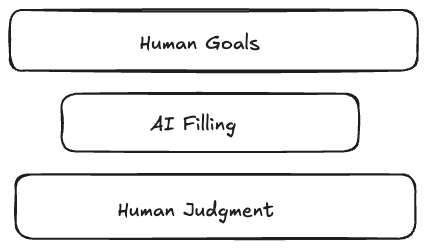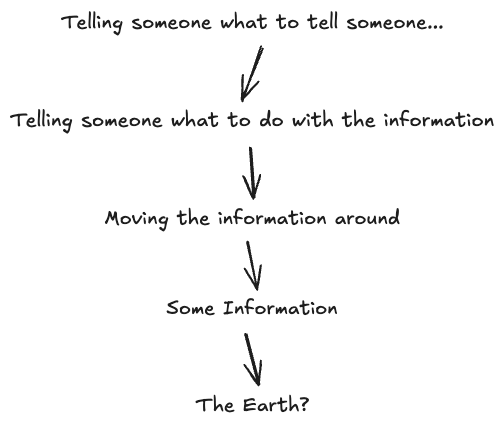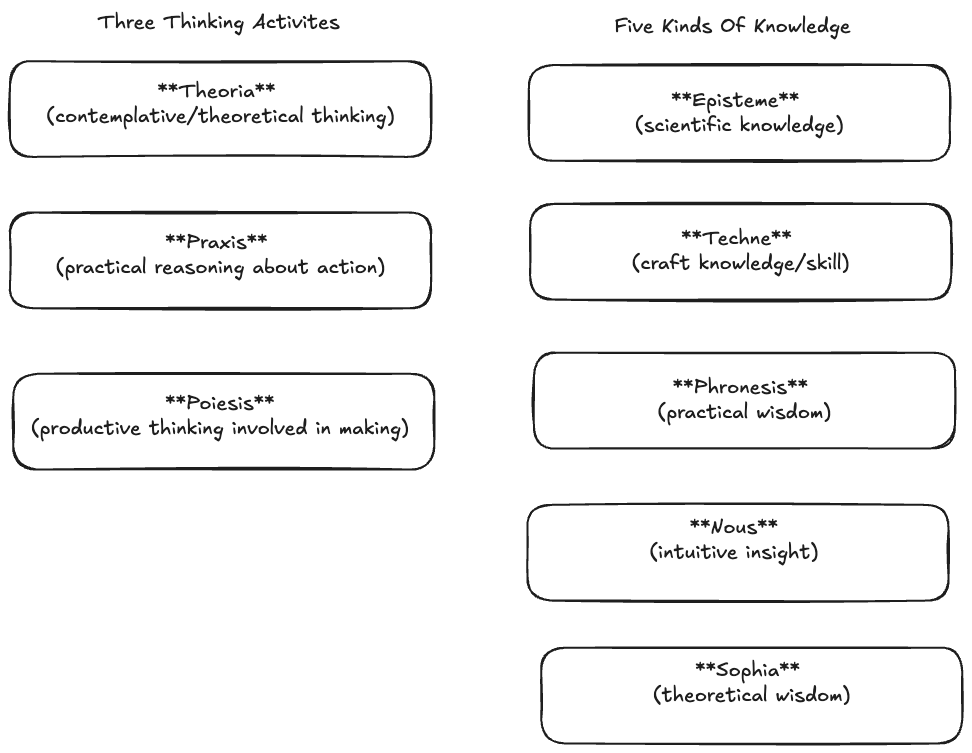Will AI take away my work?
It’s a reasonable question, but it depends what you mean by ‘work’. It makes sense then to talk a little bit about what we might mean.
Using a 93 year old definition
Here is a definition, written in 1932 by Bertrand Russell [1]
First of all: what is work? Work is of two kinds: first, altering the position of matter at or near the earth’s surface relatively to other such matter; second, telling other people to do so. The first kind is unpleasant and ill paid; the second is pleasant and highly paid. The second kind is capable of indefinite extension: there are not only those who give orders but those who give advice as to what orders should be given.
From ‘In Praise of Idleness’, in the October 1932 issue of Harpers Magazine
Let’s diagram this:

So, is AI coming for the first kind? Not without robots it can’t (and I would suggest that some of the first kind is actually quite pleasant and can be quite highly paid, such as being a very good chef, or a quarterback).
For the second kind, the kind of work that Russel suggests is pleasant and highly paid, does seem to be what the current AI ecosystem seems to be targeting. This makes sense if we consider the economics of removing something highly paid and replace it with something that is cheaper.
But here’s the thing, this assumes that an AI would have goals and not be part of a sandwich of sorts, with one slice of human bread still telling it what tell someone what to do and another slice of human bread looking at the outcome and making judgments. So yes, AI is coming for the second kind, but with caveats around goals and judgement.

Interestingly the extension of the second kind that Russell gestures to (the ‘Telling someone what to tell someone..’ In our little diagram) is where we see a lot of discussion and demos about AI being a ‘Thought Partner’ [2] that can help us craft strategies to achieve a given end.
Our diagram of work is missing something, which is the much larger proportion of people who are engaged nowadays in what we call ‘Knowledge Work’ than there were when Russell wrote his definition. We can change the definition a little, and the diagram as follows.
Work is of two kinds: first, altering the position of information at or near anywhere relatively to other such information; second, telling other people to do so. The first kind is ok, sometimes; the second is pleasant and highly paid. The second kind is capable of indefinite extension: there are not only those who give orders but those who give advice as to what orders should be given.

If we take a step back and look at these new levels, we can suggest that today in 2025 AI tools aim to at least augment if not fully automate all of these kinds of Work, with a jagged frontier depending on the domain and the costs associated with having a human do the work.
Moving information relative to other information is performed as we watch one of the mainstream models attempt to write a blog post for us, or make a simple app. In that instance we told AI what to do with the information. I can also ask AI to make suggestions, or even recommendations, and can see its influence creeping up our model. And here’s another thought - what if the blog post we ask it to write is instructional, so in a way the AI is telling a human reader what to do?
Knowledge work was described by Drucker in 1959 [3] It has been summarized as ‘thinking for a living’, with Knowledge Workers creating value through thinking that involves these kinds of tasks:
- Problem-solving and decision-making
- Analysis and interpretation of data
- Creative and strategic thinking
- Application of specialized expertise
- Innovation and knowledge creation
So what kinds of thinking are we doing when we engage in these kinds of work?
Using a 2,400 year old definition
Aristotle discussed different types of thinking activities: theoria (contemplative/theoretical thinking), praxis (practical reasoning about action), and poiesis (productive thinking involved in making). He also differentiated amongst episteme (scientific knowledge), techne (craft knowledge), phronesis (practical wisdom), nous (intuitive insight), and sophia (theoretical wisdom). [4]
Here’s how these classical Greek concepts map onto some aspects of what we would recognize as ‘Knowledge Work’:
The Three Thinking Activities
Theoria (contemplative/theoretical thinking)
- Strategic planning sessions where you step back to consider long-term industry trends
Praxis (practical reasoning about action)
- Deciding how to allocate limited resources across competing priorities
Poiesis (productive thinking involved in making)
- Building organizational processes, workflows, or training programs
The Five Types of Knowledge
Episteme (scientific knowledge)
- Applying established financial modeling or accounting principles
Techne (craft knowledge/skill)
- Mastering specific tools like Excel, Salesforce, or programming languages
Phronesis (practical wisdom)
- Balancing competing stakeholder interests with good judgment
Nous (intuitive insight)
- Instantly recognizing patterns in market data that others miss
Sophia (theoretical wisdom)
- Grasping the deeper principles that drive your entire industry
It should be noted that to have sophia one needs episteme (an understanding of why things work the way they do) and nous (the ability to just get something)

Can AI do these? I think it depends on how we measure success for these kinds of thinking in the real world. My own limited experience with AI tools suggests the following:
-
Contemplative/theoretical thinking. Not so much. To me this implies a self directed thought process. We can watch the tools as they ‘reason’, but we don’t see them ‘contemplate’
-
Practical reasoning about action. I think so, sometimes. We can give an AI a conceptual starting point and a desired end point and watch it ‘reason’ its way from A to B.
-
Productive thinking involved in making. Yes, I believe so. I have watched AI build simple apps for me, so yes, although I would change the phrase to ‘Productive reasoning involved in making’ - Reasoning is a subset of Thinking.
-
Scientific (technical) knowledge. Yes, AI is an employee with an encyclopedic knowledge.
-
Craft knowledge or skill. It depends on the domain, but in the world of Knowledge Work AI posesses many skills.
-
Practical wisdon. I think this is where we start to see the jagged frontier. Where heuristics are available, then AI has access to them and it can make judgement calls.
-
Intuitive insight. I havent seen an AI tool do this, but this summary is based on my own experience with using AI in my work. However I am going to go out on a limb and say no, it can’t do something this uniquely human.
-
Theoretical wisdom. We said earlier that to have this one needs one needs an understanding of why things work the way they do, which AI can do with its encyclopedic knowledge, but also intuition, which we have decided AI cannot do. So its fair to say that AI would struggle here too.
Again, if we think about the economics and ask what activities money is spent on as a whole, then the more ubiqutious the activity, the more likely a tool has been developed that can augment or automate that activity.
So is AI coming for my work?
If you are a somewhere in our revised Russell diagram (moving information around for a living), it is generally accepted that AI is able to do at least some of the work.
If I were in the business of ’altering the position of matter at or near the earth’s surface relatively to other such matter’ then I would be concerned about machines in general.
Hopefully someone would pull me to one side and advise me not to pick a fight with a steam shovel, because I would lose. They might ask me to consider the work I would gladly do for free, such as being a very good chef, or a quarterback, because machines are bad at those things which we would do just for kicks anyway.
Or if I was in the business of thinking for a living, they might ask me to consider what thinking I would gladly do for free and concentrate on that. Some such activites, related to Theoria, Nous and Sophia are things humans do for free anyway and paradoxically will increase in value because machines are bad at those things which we dould do just for kicks anyway.